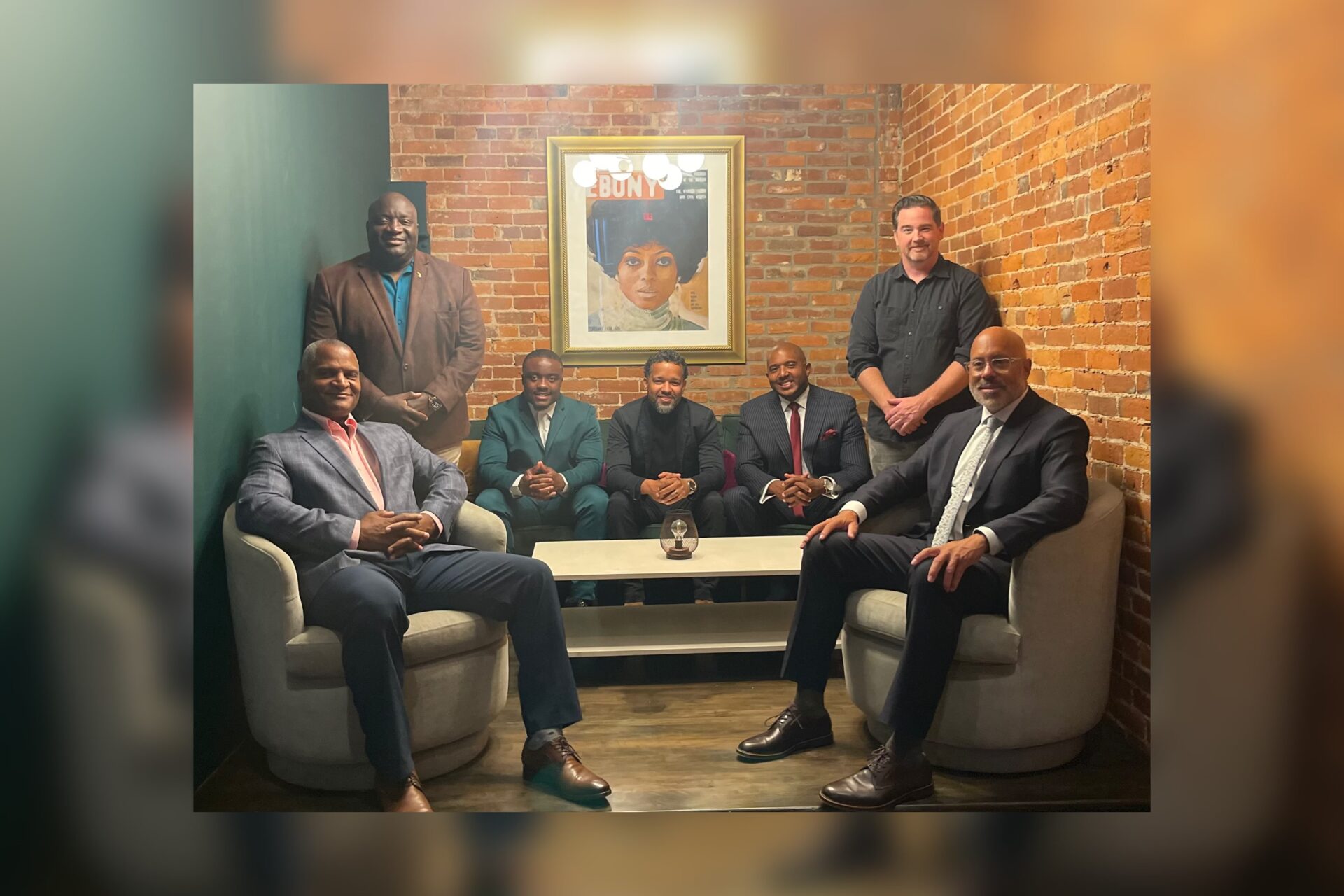
October 7, 2024
‘Kalamazoo Forward Ventures’ To Fund Business And Innovation In Southwest Michigan
Kalamazoo Has Something To Say To The Tune Of $50M
In Kalamazoo, Michigan, where non-minority-owned employers firms (3367) outnumber minority-owned employer firms (255) by roughly 12 times, according to the United States Census Bureau, seven men have joined forces to be the change they want to see in their community. On Sept. 24, the collective known as Kalamazoo Forward Ventures (KZFV) announced its commitment: a whopping “$50 million capital investment” for underrepresented businesses and founders, across three sectors, that are seeking assistance to startup or scale up their companies.
“We got together, came up with a concept and here we are,” Von H. Washington, Jr. told BLACK ENTERPRISE.
“We are a venture fund that’s focusing on three areas of our community, venture capital, real estate and Main Street; Main Street being those small business owners who are really just trying to put it together and they need access and capital so they can scale.”
The group is comprised of CEOs, educators, and public advocates, who have a wealth of experience and knowledge among them, and includes former Kalamazoo Mayor Bobby Hopewell—and the youngest partner Jamauri Bogan, who is also the first and only Black real estate developer in the ambitious Midwest city.
“We know there’s a few things that’s happening in the housing ecosystem,” Bogan addressed audience members.
“There’s a shortage of housing and when we look at the overall landscape of BIPOC-, Black-, women- owned development companies around the country, there’s less than 1 percent. And so, we have to figure out a way to move the needle to make a difference. That’s why we created a real estate fund to address the housing shortage here in Kalamazoo.”
Hopewell’s upbringing in Kalamazoo and his ventures in business, healthcare, and government policy have aptly prepared him for his role in KZFV, particularly his tenure as the city’s mayor.
“Every opportunity l’ve had, every interaction I’ve been able to have with building relationships and connecting to people in different neighborhoods, different businesses, other governmental leaders within and outside of our city, has grown me to be able to wander into spaces and have conversations differently,” the former mayor told BE.
“I’m also a product of a single mom.”
Hopewell continued: “I have four brothers and sisters that inform my thinking …. I’m also involved in health care [and] have been for most of my career …. whether it’s being a mayor, being an entrepreneur, being a CEO, all of these things drive me to understand that we have to broaden the tent, that we have to bring folks together. It’s about relationships, it’s about standing by somebody, standing behind, somebody, standing in front of them at times. All of that creates the grand tapestry that we’re trying to make in this city and beyond.”
Collectively, the partners have a solid vision and an intentional plan to move western Michigan forward with their newly launched initiative
“The goal is to find opportunities in our community to support our small businesses,” Dwayne Powell Jr. shared. “Whether it be our students, whether it be our neighborhood businesses, whether it be minority- or women—our under-represented entrepreneurs with traditional business.”
Powell added, “Our goal is to get in where we fit in. We want to support the existing organizations that are already supporting our small businesses.”
Kalamazoo Forward Venture is surely a much needed alternative for Black businesses in Kalamazoo to get in the game or perhaps level the playing field. In 2020, as companies and entrepreneurs were feeling the brunt of the global pandemic due to COVID-19, Kalamazoo Micro-Enterprise Grants were given to 100 local businesses. Fifty-eight percent of the grant, which was facilitated by United Way of Battle Creek and Kalamazoo Region, was allocated to white-owned businesses, Community Voices, reported. Out of the $500,000 dispersed, under one-third was received by Black businesses. Even more disappointing is African Americans were allegedly left out of grant funding from the Michigan Economic Development Corporation (MEDC) through Southwest Michigan First. Nicole Triplett, who founded Kalamazoo Black Wall Street Facebook group, called out the disparity and took up grievances on her platform through a series of conversations which led United Way to reaccess
“[United Way] turned what was intended to be a loan-only fund into a loan and grant fund and were willing to look at their application process. Black Wall Street Kalamazoo was able to allow Black entrepreneurs the chance to apply as well, and many were awarded,” Triplett told the local outlet.
KZFV emerged after recognizing these types of gaps in funding which fall disproportionately among the underserved demographic in Kalamazoo.
“We’re a for-profit organization but we are going to look at those venture capital opportunities that may have fallen just on the outside that may need a little bit more support,” Eric L. Wimbley told BE.
“We may be taking a little bigger risk depending on the people that are presenting the idea. We do wanna serve our BIPOC community. We do wanna serve our women of color and women in all aspects … people who are just being missed and not given the opportunity.”
KZFV partner Eric B. Cunningham chimed in: “This is going to be relational, not gonna be transactional.”
“Our ability to get [future leaders and entrepreneurs] at a young age is going to create the future that we need, and it’s gonna be moving at the speed of trust and then also the educational component, we have huge educational institutions here that we can really lean into … it’s gonna be a cultural change.”
RELATED CONTENT: Black Men XCEL Summit 2024